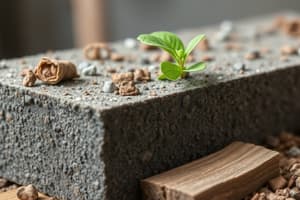Podcast
Questions and Answers
What is the name of the chemical group represented by the structure -Si-O-Al-O?
What is the name of the chemical group represented by the structure -Si-O-Al-O?
- siloxo
- sialate (correct)
- phospho-sialate
- poly(siloxo)
Which two alkaline liquids can be combined in the preparation of geopolymer concrete?
Which two alkaline liquids can be combined in the preparation of geopolymer concrete?
- Sodium hydroxide and Sodium silicate (correct)
- Sodium hydroxide and Potassium peroxide
- Sodium hydroxide and Calcium silicate
- Potassium hydroxide and Calcium hydroxide
How does the carbon dioxide emission of geopolymer concrete (GPC) compare to that of ordinary Portland cement concrete (OPC)?
How does the carbon dioxide emission of geopolymer concrete (GPC) compare to that of ordinary Portland cement concrete (OPC)?
- GPC produces more carbon dioxide than OPC
- GPC has low carbon dioxide emission (correct)
- GPC emits no carbon dioxide
- GPC's carbon dioxide emission is slightly higher than OPC
Which parameter significantly affects the compressive strength of polymer concrete based on the figures presented?
Which parameter significantly affects the compressive strength of polymer concrete based on the figures presented?
What distinguishes the production process of geopolymer concrete from that of ordinary Portland cement concrete?
What distinguishes the production process of geopolymer concrete from that of ordinary Portland cement concrete?
Which material is NOT a rich source of alumina-silicate for geopolymer concrete preparation?
Which material is NOT a rich source of alumina-silicate for geopolymer concrete preparation?
What is one of the advantages of geopolymer concrete in terms of energy requirement for production?
What is one of the advantages of geopolymer concrete in terms of energy requirement for production?
What effect does the addition of superplasticizer have on polymer concrete?
What effect does the addition of superplasticizer have on polymer concrete?
What should be performed to check the workability of fresh geopolymer concrete?
What should be performed to check the workability of fresh geopolymer concrete?
Which of the following is NOT an application of geopolymer concrete?
Which of the following is NOT an application of geopolymer concrete?
Which property is NOT an advantage of geopolymer concrete?
Which property is NOT an advantage of geopolymer concrete?
What effect does increasing the curing temperature have on the compressive strength of geopolymer concrete?
What effect does increasing the curing temperature have on the compressive strength of geopolymer concrete?
What is a disadvantage of geopolymer concrete related to its production process?
What is a disadvantage of geopolymer concrete related to its production process?
How does the inclusion of superplasticiser affect the workability of geopolymer concrete?
How does the inclusion of superplasticiser affect the workability of geopolymer concrete?
Which statement regarding the tensile strength of geopolymer concrete is true?
Which statement regarding the tensile strength of geopolymer concrete is true?
What can be concluded about the compressive strength of geopolymer concrete after a one-day rest period?
What can be concluded about the compressive strength of geopolymer concrete after a one-day rest period?
What is the primary aim of using Pozzolanic materials in geopolymer concrete?
What is the primary aim of using Pozzolanic materials in geopolymer concrete?
Which of the following materials can serve as a precursor in the formation of geopolymers?
Which of the following materials can serve as a precursor in the formation of geopolymers?
What role does sodium silicate play in the preparation of geopolymer concrete?
What role does sodium silicate play in the preparation of geopolymer concrete?
Which characteristic is NOT associated with geopolymer concrete?
Which characteristic is NOT associated with geopolymer concrete?
In terms of environmental impact, how does geopolymer concrete compare to Ordinary Portland Cement?
In terms of environmental impact, how does geopolymer concrete compare to Ordinary Portland Cement?
What is the main bonding agent in geopolymer concrete?
What is the main bonding agent in geopolymer concrete?
Which of the following is considered a disadvantage of geopolymer concrete?
Which of the following is considered a disadvantage of geopolymer concrete?
How does the production method of geopolymer concrete align with sustainability efforts?
How does the production method of geopolymer concrete align with sustainability efforts?
How does the compressive strength of geopolymer concrete (GPC) compare to ordinary Portland cement (OPC) in the long term?
How does the compressive strength of geopolymer concrete (GPC) compare to ordinary Portland cement (OPC) in the long term?
What is one of the primary advantages of using fly ash in geopolymer concrete?
What is one of the primary advantages of using fly ash in geopolymer concrete?
What effect does high temperature exposure have on fly ash geopolymer concrete's compressive strength?
What effect does high temperature exposure have on fly ash geopolymer concrete's compressive strength?
Which property of geopolymer concrete is considered better compared to ordinary Portland cement when exposed to seawater?
Which property of geopolymer concrete is considered better compared to ordinary Portland cement when exposed to seawater?
What characteristic of geopolymer concrete helps it to have lower absorption rates compared to normal concrete?
What characteristic of geopolymer concrete helps it to have lower absorption rates compared to normal concrete?
What happens to fly ash geopolymer concrete after multiple freeze and thaw cycles?
What happens to fly ash geopolymer concrete after multiple freeze and thaw cycles?
How does the modulus of elasticity of geopolymer mixes compare to that of ordinary Portland cement?
How does the modulus of elasticity of geopolymer mixes compare to that of ordinary Portland cement?
What is a key aspect of the geopolymerization process when exposed to high temperatures?
What is a key aspect of the geopolymerization process when exposed to high temperatures?
Flashcards are hidden until you start studying
Study Notes
Geopolymer Concrete
- Geopolymer concrete is a viable alternative to traditional concrete using ordinary Portland cement (OPC)
- Geopolymer concrete offers advantages in durability, strength, and sustainability
- Geopolymers are formed by an alkali activation process that uses aluminosilicate materials such as fly ash, blast furnace slag, and metakaolin
- The alkali activating solution is prepared by mixing sodium silicate (Na2SiO3) and sodium hydroxide (NaOH) in a ratio of 2:2.5
- Geopolymer concrete has lower carbon dioxide emissions than OPC concrete.
Chemistry of Geopolymer Concrete
- Geopolymers consist of covalently bonded amorphous minerals and contain various molecular groups, such as siloxo, sialate, sialate-siloxo, sialate-disiloxo, phosphate, phospho-siloxo, phospho-sialate, and organo-siloxo.
- The structure of geopolymers resembles zeolites.
Preparation of Geopolymer Concrete
- Geopolymer concrete is made by mixing aluminosilicate materials, alkaline liquids, and aggregates.
- Aluminosilicates act as the source material, while alkaline liquids, such as sodium hydroxide and sodium silicate, activate the geopolymerization process.
- Common aluminosilicate sources include fly ash and metakaolin.
Properties of Geopolymer Concrete
- Compressive Strength: While geopolymers have lower early strength compared to OPC, they exhibit higher strength gain over time.
- Split Tensile Strength: Geopolymer concrete has a higher split tensile strength compared to OPC concrete.
- Modulus of Elasticity: Geopolymer concrete generally has a higher modulus of elasticity.
- Thermal Resistance: Geopolymer concrete made using Class F fly ash exhibits excellent thermal resistance up to 800°C.
- Corrosion Resistance: Geopolymer concrete demonstrates superior corrosion resistance.
- Chloride Attack: Geopolymer concrete is more resistant to chloride attack due to its porous aluminosilicate structure.
Durability and Long-Term Performance of Geopolymer Concrete
- Geopolymer concrete performs well in seawater environments due to its chloride resistance and low permeability.
- It maintains good compressive strength even at high temperatures (400°C to 500°C) because the geopolymerization process continues at these temperatures.
- Geopolymer concrete exhibits low drying shrinkage and creep.
- It also demonstrates good resistance to freeze-thaw cycles.
- Geopolymer concrete effectively prevents alkali-silica reaction (ASR) by utilizing low water-cement ratios and incorporating fly ash, which further increases its impermeability.
Applications of Geopolymer Concrete
- Precast Elements: Geopolymer concrete is suitable for precast elements like railway sleepers and electric poles.
- Marine Structures: Geopolymer's resistance to seawater makes it well-suited for marine structures.
- Pavements and Retaining Walls: Geopolymer concrete finds applications in pavements and retaining walls.
- Sewer Pipes: Geopolymer concrete is an ideal material for construction of sewer pipes.
Advantages of Geopolymer Concrete
- Eco-Friendly: Geopolymer concrete is considered eco-friendly due to its low carbon footprint compared to OPC.
- Cost-Effectiveness: Fly ash, a significant component of geopolymer concrete, is relatively inexpensive.
- High Strength: Geopolymer concrete offers good compressive strength.
- Fire Resistance: Geopolymers possess excellent fire resistance.
- Low Permeability: Geopolymer concrete exhibits low permeability, protecting structures from water ingress.
- Chemical Resistance: Geopolymer concrete possesses excellent resistance to both acidic and saline environments.
Disadvantages of Geopolymer Concrete
- Complicated Process: The geopolymerization process is sensitive and can be challenging to control.
- Production Challenges: Production of geopolymer concrete can be difficult to scale-up.
- Limited Availability: Pre-mixed geopolymers are not as readily available as OPC.
Conclusion
- Geopolymer concrete presents a sustainable alternative to OPC concrete with advantages in durability, strength, and reduced carbon footprint.
- The properties of geopolymer concrete can be further enhanced by adjusting the mix design, including factors like curing temperature, rest period, and use of superplasticizers.
- Geopolymer concrete holds potential for future construction projects, contributing to sustainable infrastructure development and environmental benefits.
Studying That Suits You
Use AI to generate personalized quizzes and flashcards to suit your learning preferences.




